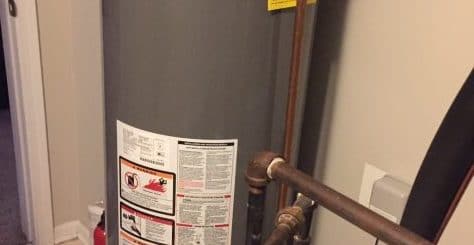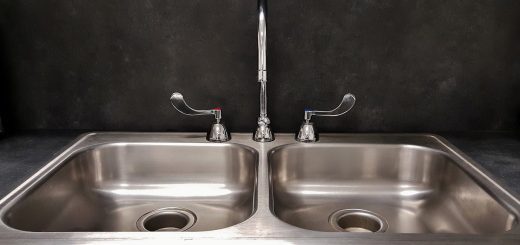How a Sealer Protects your Granite Countertops
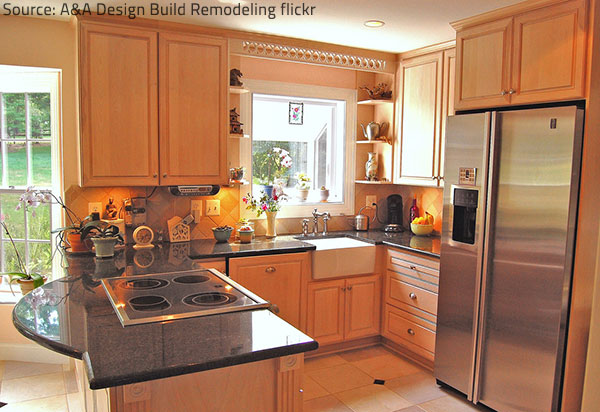
Granite countertops combine great practical functionality with high aesthetic value.
Considering the durability, practicality, and glamorous look of granite countertops, it’s no wonder that they have become such a widely preferred kitchen feature over the last several decades. Granite combines functionality with aesthetic value to create a charming accent in your home, while providing you with an enduring and convenient surface to work on. Beautiful and highly efficient as granite countertops may be though, they are not invulnerable to wear and tear. To keep the stone surfaces from deteriorating or staining and extend the life and utility of your countertops, you need to have them properly sealed and well maintained. In fact, quality granite sealers provide such good protection to the delicate stone surfaces that they become quite easy to clean and maintain.
So, when it comes to protecting granite countertops and keeping them in excellent condition for a long time, sealing the surfaces is your best bet.
Why Do You Need To Seal Granite Countertops
Granite is quite porousPorous describes a material that contains small openings or ... More, so it quickly absorbs liquids, semi-solid materials, and even bacteria. Unless you remove a spill as soon as it occurs, the liquid will easily penetrate deep into the stone and will permanently stain the surface. To restore the gorgeous look and feel of your damaged countertop, you will need professional assistance.
However, if the countertop has been sealed, the spilled substances will stay on the surface for much longer giving you enough time to clean it up.
When granite sealer is applied to the surface, it penetrates the pores and “clogs” them, greatly reducing the absorbency rate of the stone. Therefore, liquids and other fluid materials are not easily absorbed and cannot stain the surface. This is why sealing is so essential for proper granite countertop care.
How Does Granite Sealer Work
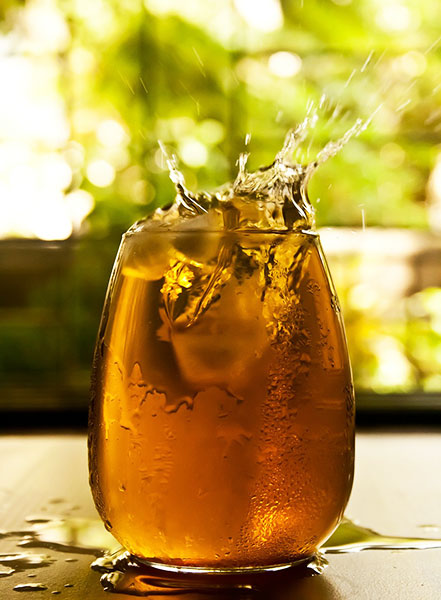
When your granite countertops are properly sealed, spilled liquids will not be easily absorbed and you will have enough time to clean them up and prevent staining.
Stone sealers consist of a resin dissolved in water or a petroleum-based solventA solvent is a liquid capable of dissolving other substances... More. When applied to the surface, they form a protective film that prevents dirt, dust, and moisture from seeping through the stone. The granite sealer needs to stay on the surface long enough to be absorbed into the pores of the stone (so that the resin can literally seal the pores). When this is achieved, any excess sealer is wiped off the surface, the water (or solventA solvent is a liquid capable of dissolving other substances... More base) evaporates, and the resin dries fully to create a protective barrier against stains and minor blemishes.
However, stains can still occur even when the granite surface is properly sealed. The sealer cannot perfectly fill every pore in the stone, so if coffee, wine, oil or other spills are left on the countertop long enough, the liquid will eventually seep through. The barrier created by the granite sealer is actually below the surface, so while deep staining is successfully prevented, surface staining can occur in the case of prolonged exposure. Yet, you can rarely see stains on well-sealed countertops, as most liquids (except for oils) evaporate soon enough and can penetrate the stone.
While granite countertop sealers cannot fully prevent the stone from being stained, they greatly reduce its absorbency rate, thus making it really difficult to mar the delicate granite surfaces. However, the level of protection may vary considerably, depending on the quality of the sealer and the quality of the application.
When To Seal Granite Countertops
When installing new countertops, you can choose from a large variety of natural stones for your kitchen renovation project. Have in mind that different types of granite vary not only in color and patterns but also in some essential characteristics, such as the density of the stone, the grade of the material, etc.
Some granite stones are so dense that they are resistant to liquid absorptionAbsorption is the process by which a material takes in or so... More and don’t need sealing at all. Such dense granites (usually the darker ones) won’t absorb a sealer either – if applied to the stone, it will dry over the surface, resulting in a hazy build-up of residueResidue is any leftover material, such as soot, dust, or che... More and a dull appearance without providing any extra protection. So, if you have chosen dark granite for your new kitchen countertops, sealing is not recommendable.
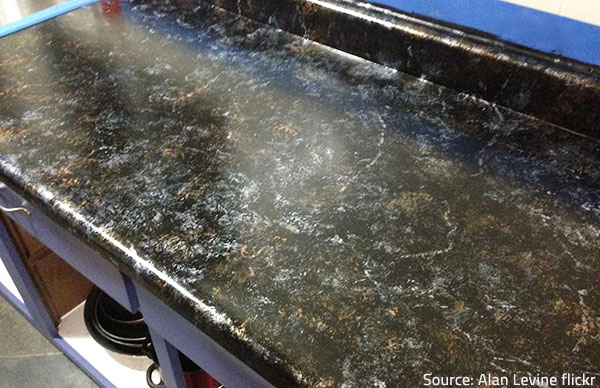
Most darker granites are so dense that they won’t absorb a sealer.
Some granite slabs are pre-sealed during manufacture. They are extremely durable as the sealant penetrates the stone to a deep level and provides lasting protection. If you have pre-sealed granite countertops installed in your kitchen, you can expect them to remain in excellent condition for about 10-15 years, provided that the stone is diligently and properly cared for.
In all other case, you should have your new countertops sealed before anything else is installed on (or near) them. Otherwise, it will be impossible to reach and properly seal all the edges and hidden areas of the granite slabs. If you are moving into a new place and intend to keep the existing granite countertops, you are advised to have them professionally resealed in advance.
How To Seal Granite Countertops
Sealing granite countertops is not very difficult or time-consuming but you need to pay meticulous attention to the details:
- Choose a quality granite sealer – high quality sealants provide long term protection without the need for frequent maintenanceMaintenance is the routine care, inspection, and repair of a... More or reapplication. Look for a stone sealer that is appropriate for the specific type of granite you have in your home and make sure it will enhance the functionality of your countertops without degrading their look or feel (always test your chosen product on a small inconspicuous area first). You want the countertop surface to become resistant to stains from food, drinks, oil, and other common household substances, as well as to be scratch-proof, easy to clean, and safe (non-toxic);
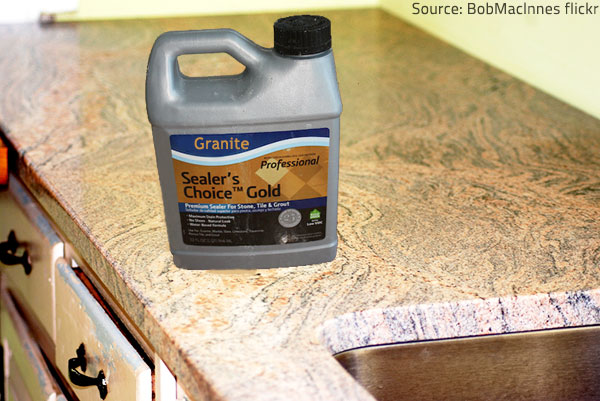
Quality granite sealers create a long-lasting protective barrier against stains and minor blemishes.
- Clean the surfaces thoroughly – use a dry clean rag to remove any larger particles from the countertop surface, then wipe it clean of any dust, dirt, or soap residues with the help of an appropriate cleaning solutionA solution is a homogeneous mixture of two or more substance... More, and let it dry well;
- Apply the sealant as directed by the manufacturer – work one section at a time and allow about five minutes for the sealer to penetrate the stone before applying a second layer. Wipe off any residueResidue is any leftover material, such as soot, dust, or che... More with a clean dry cloth;
- Apply a finishing layer after a couple of hours – wait for the sealant to dry completely and then apply one final layer. Remember that it is of paramount importance to completely remove any sealer residueResidue is any leftover material, such as soot, dust, or che... More from the surface after it has been absorbed into the pores, but before it dries.
However successful you may be, have in mind that hiring a stone restorationRestoration is the process of returning a property to its pr... More professional to treat your granite countertops will yield much better results – the specialists will not only ensure that every square inch of the surface is properly covered, but will also know what sealing products are most appropriate for your particular circumstances, how to safely work with them, and exactly how long they take to dry. This will result in an extremely durable and glamorously looking surface – a professionally applied quality sealer will enhance the value of your granite countertops and will protect them for many years to come.
How Often Do You Need To Reseal Granite Countertops
Even the highest quality granite countertop sealers break down over time as the resin is slowly degraded by cleaning products and general use. Resealing frequency, however, depends on the porosity of the stone, the quality of the sealant used, the competence of the workmanship, and the proper maintenanceMaintenance is the routine care, inspection, and repair of a... More of the sealed surface.
While many light colored granites need resealing every 3-5 years, you should test your countertops to determine for sure if it’s the right time to have them resealed or not. Just drip a bit of water or another liquid on the surface and wait for about 5-10 minutes. If the countertop is still well protected, the small droplets will bead on the surface. If they are absorbed or if the wet area becomes dark or discolored, you need to reseal the stone without delay.
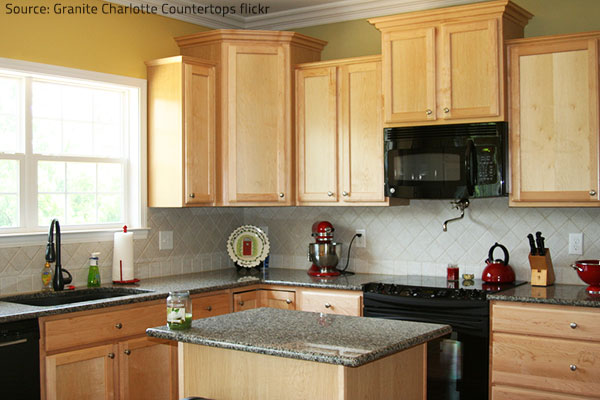
Sealing granite countertops results in durable and beautiful surfaces that can withstand the test of time without losing their appeal.
Sealing the delicate stone surface is one of the most efficient methods to protect granite countertops. While granite sealers do not act as a shield that absolutely prevents staining and damage to the stone, they successfully fill any fissures in the surface and seal the numerous pores that would otherwise accumulate moisture and dirt. The result is a beautiful and durable countertop that will retain its practical and aesthetic value for many years of daily use.











